You'll Never Lose Belly Fat if You're Still Eating These 10 Things
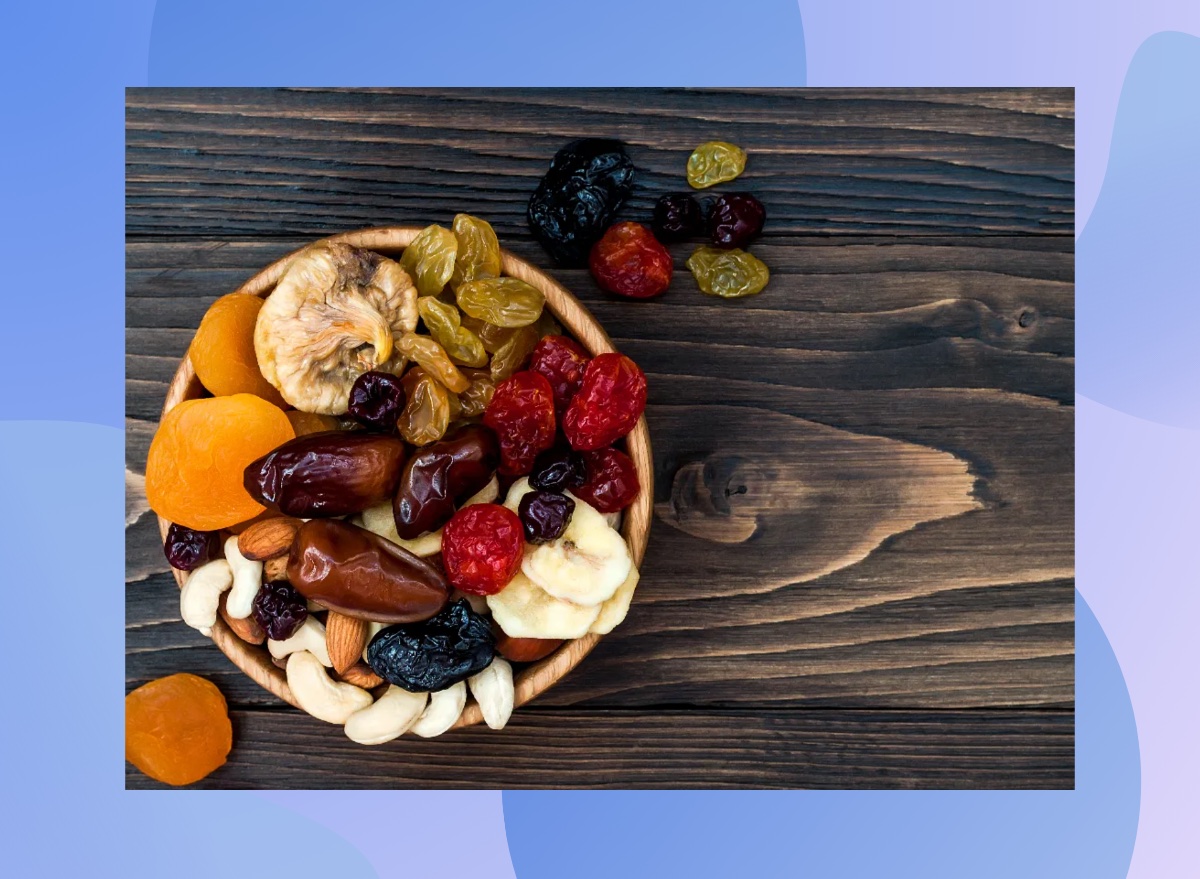
Dealing with belly fat or "love handles" can be stubborn and frustrating. It may even leave you feeling defeated despite your best weight-loss efforts. Cutting calories, eating more protein, and watching carbs are popular methods for shedding excess pounds. These methods may help with unwanted belly fat, but certain foods prevent you from losing belly fat.
Several factors, including hormones and gender, can influence abdominal fat. Of course, your food choices can play a major role, too. Eating more calories than you burn in a day will likely result in weight gain, some of which may be in your midsection. Additionally, the types of calories you choose can impact your weight and fat mass. Sugar, in particular, has been documented to promote obesity, according to research. If you could do one thing to lose belly fat, limiting your added sugar intake may be your best bet.
In addition to your diet, stress can also play a role in accumulating abdominal fat. While easier said than done, managing your stress through various methods could help with your leanness goals. Daily meditation, exercise, and adequate sleep all contribute to reducing stress. Alongside a lower-stress lifestyle, you'll want to keep an eye on your food choices because you'll never lose your belly fat if you're still eating these 10 things.
The Foods
- Pie
- Brownies
- Low-Fat Yogurt
- Granola
- Cereal Bars
- Canned Fruit
- BBQ Sauce
- Canned Baked Beans
- Biscuits and Gravy
- Sweetened Dried Fruit
Pie
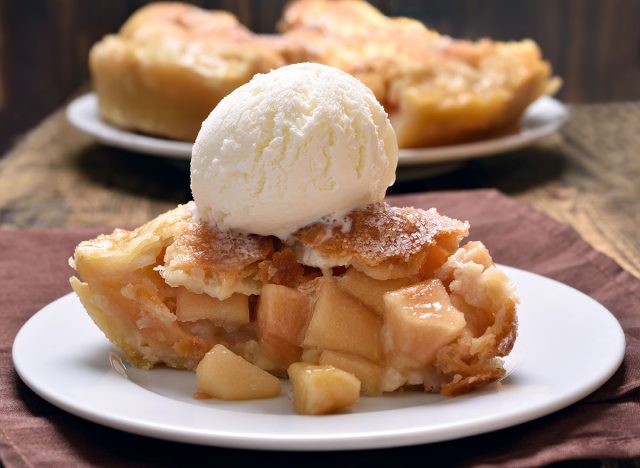
Sweet and available in numerous varieties, pie is a popular dessert at holidays and celebrations. However, even those made with fruit can pack a surprising amount of added sugar.
While all pie recipes differ, you can easily find a single serving containing more than 25 grams of added sugar. The American Heart Association recommends women consume no more than 25 grams (100 calories) of added sugar per day, while men should limit their intake to 36 grams (150 calories). That means a single slice of pie could use your entire sugar budget for the day.
Next time pie is offered as a dessert, opt for just a few small bites to keep your sugar consumption at bay.
Brownies
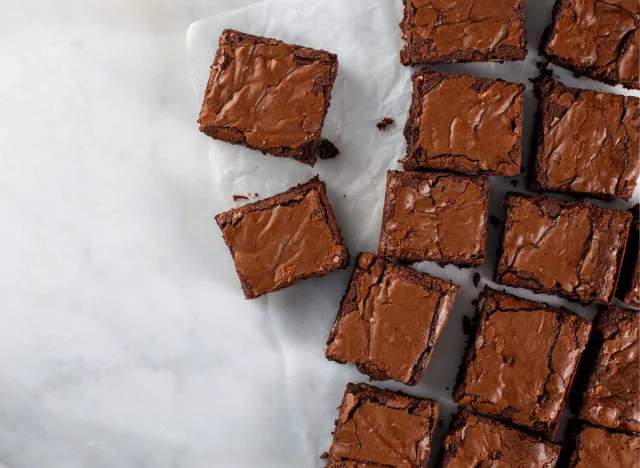
Another beloved dessert, brownies are also notorious for their sugar content. When making homemade brownies, you may easily find recipes that call for 2 cups of sugar, not to mention the sugar in the chocolate chips you use. This can lead to a very high-sugar treat, preventing you from meeting your belly fat-loss goals.
When baking at home, you can use low-sugar dark chocolate chips to cut the sugar in your brownies. In addition, consider swapping some of the granulated sugar for unsweetened applesauce as another method of reducing sugar.
Low-Fat Yogurt
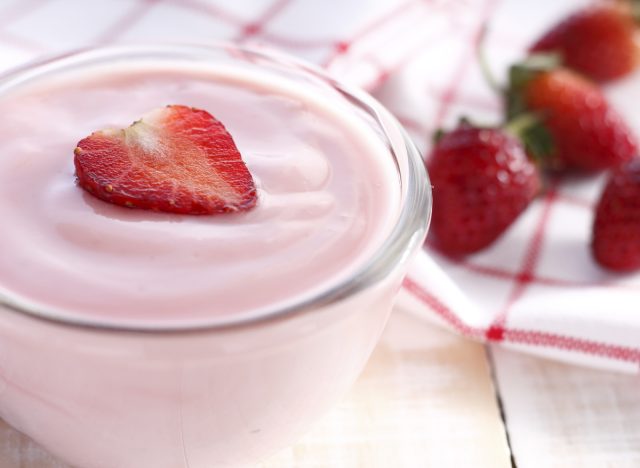
Although marketed as a diet food, low-fat yogurt is often a sneaky source of added sugar. For example, an individual cup could have more than 17 grams of sugar. While this snack may contain fewer than 150 calories, making it appear as a healthy option, it could be slowing down your weight loss progress.
Instead, look for higher-protein, low-sugar yogurt. In addition to lowering your sugar intake, this swap will increase the protein in your diet, which can lead to more satiety and lower calorie intake throughout the day.
Granola
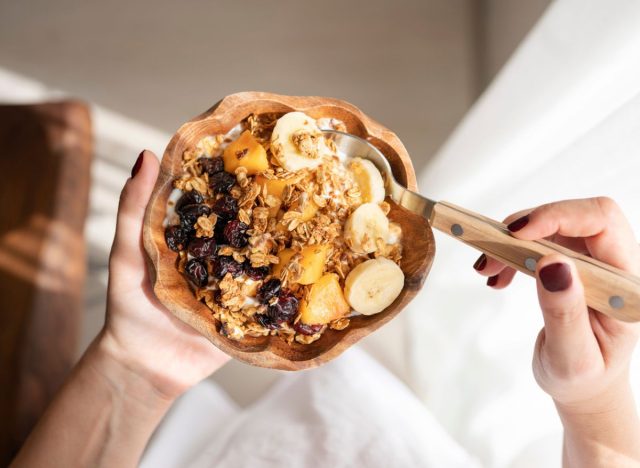
Whether used as a topping to your yogurt or enjoyed in a bowl with milk, granola could also be preventing you from losing belly fat. You may be surprised to learn a half cup of granola could be over 200 calories. This is a fairly small portion, and when eating as a cereal alternative, you may have double or triple this amount.
Granola is often made with oil, nuts, seeds, and added sugar, contributing to a higher-calorie food. While the nuts, seeds, and oats in granola are satiating ingredients due to their protein and fiber content, the added sugar, dried fruit, and oil can provide a less ideal source of calories.
The next time you serve yourself some granola, stick with a small portion or consider making a batch at home that uses less added sugar and oil than commercially made options.
Cereal Bars
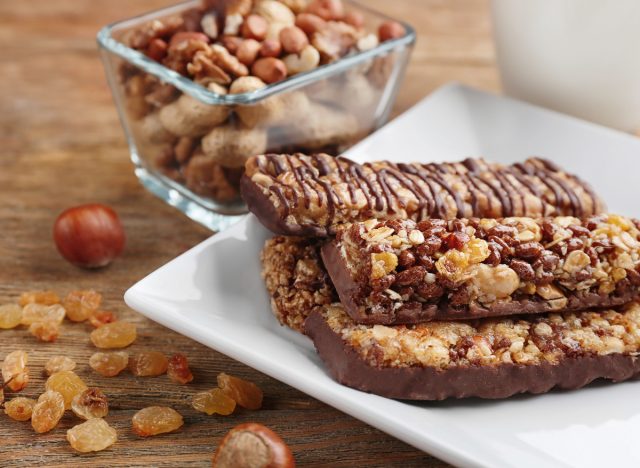
A popular item for grab-and-go breakfasts, cereal bars aren't known for being packed with satiating ingredients. Most options contain minimal protein and fiber, leaving you with a less filling meal or snack, not to mention the high sugar count found in many of these bars.
If you are looking for a bar option for quick meals, opt for one with fewer than 6 grams of added sugar, at least 8 grams of protein, and 2 grams of fiber.
Canned Fruit
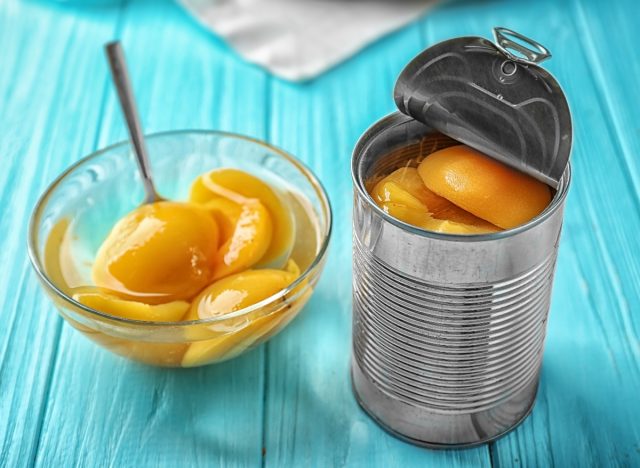
Canned fruit and sweetened mandarin oranges may be some of the most popular items in this category, but there are many packaged, processed fruits to watch out for. Options chock-full of syrup can be a dense source of added sugar. Not to mention, much of this processed fruit has less fiber than whole fruit.
If you want to get your kids to eat more produce by offering packaged fruit, look for options made without added sweeteners. The nutrition facts should show no added sugar, leaving the sweetness to come naturally from the fruit itself.
BBQ Sauce
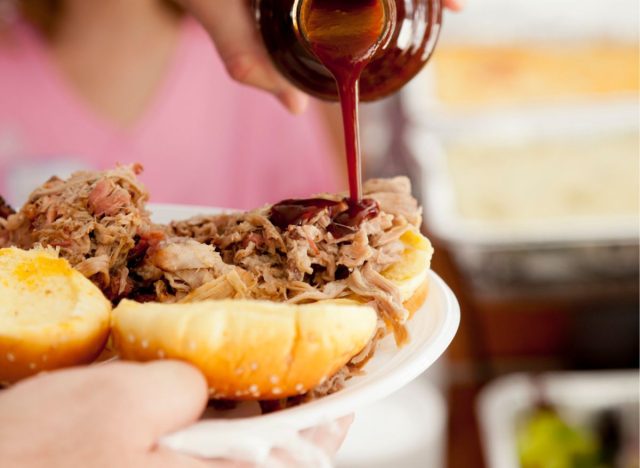
A flavorful way to enhance your grilled meats, you may be surprised by the amount of sugar in BBQ sauce. Two tablespoons of sauce can have around 10 grams of sugar, and many will use a portion much more than this when cooking. In fact, you may even see corn syrup listed before tomato in the ingredients lists of popular BBQ sauce brands.
If you are looking to reduce the sugar you get from BBQ sauce but still want to add flavor to your meat, try marinating them ahead of time with herbs, spices, garlic, mustard, and apple cider vinegar for flavor without the sugar.
Canned Baked Beans
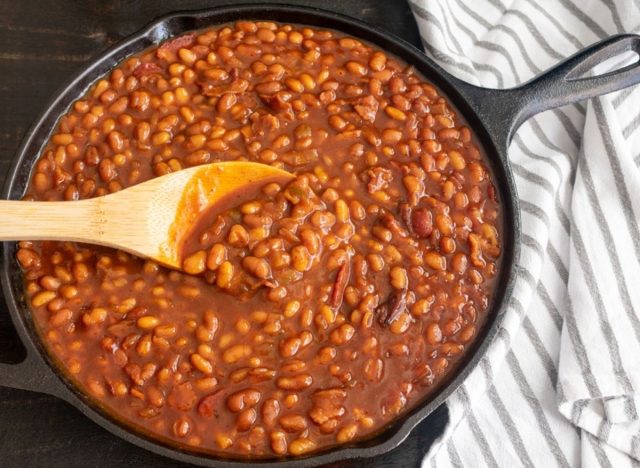
Often enjoyed alongside grilled meats, baked beans are another source of added sugar. A half-cup portion of canned baked beans can have 10 grams of sugar, making them less than ideal for your belly fat-loss goals.
Beans are a source of satiating fiber and protein, so they can be an important food for weight loss and overall health. Homemade baked beans using less sugar may be a good alternative, or swap the flavors of baked beans altogether for a black bean salad that contains veggies, like corn, tomato, and onion.
Biscuits and Gravy
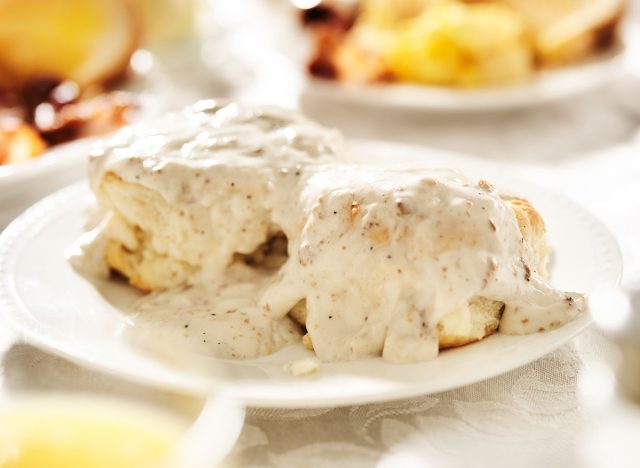
A southern staple, biscuits and gravy are more known for their comforting flavors than nutrient density. Although not especially high in sugar, this dish packs a lot of calories into a fairly small package. A single biscuit with a serving of gravy could pack nearly 500 calories, many of which come from low-fiber carbs and saturated fat. A high-calorie meal like this that is relatively low in satiating protein and fiber could lead to more snacking throughout the day, slowing your weight loss process.
Next time around, skip the gravy and enjoy the biscuit with some lean protein and veggies, like egg whites scrambled with mushrooms and bell pepper, for a higher fiber and protein meal.
Sweetened Dried Fruit
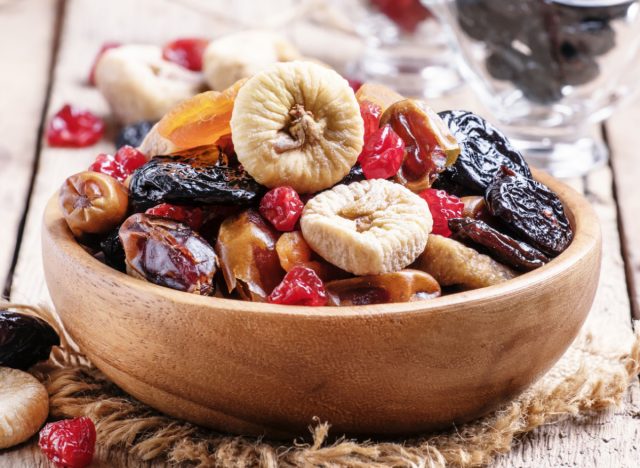
Last but not least, if you want to lose belly fat, ditch the dried fruit! Dried fruit can be a source of fiber and iron, but many varieties contain significant added sugar. In fact, you are likely to see a sweetener listed as the second ingredient of many dried fruit options.
Luckily, some varieties are made without added sugar—you just have to sift through the shelves to find them. Raisins traditionally don't include added sugar, but most other varieties do. You're better off sticking to whole fruit, which can contain more fiber and volume per serving. But if dried fruit is essential for you, search for those without added sugar to aid in your weight-loss progress.
- Source: https://www.ncbi.nlm.nih.gov/pmc/articles/PMC6959843/
- Source: https://www.heart.org/en/healthy-living/healthy-eating/eat-smart/sugar/how-much-sugar-is-too-much
- Source: https://fdc.nal.usda.gov/fdc-app.html#/food-details/519499/nutrients
- Source: https://fdc.nal.usda.gov/fdc-app.html#/food-details/175182/nutrients
- Source: https://fdc.nal.usda.gov/fdc-app.html#/food-details/2022387/nutrients









